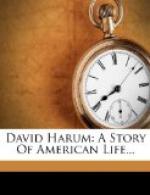“I don’t see anythin’ in that to laugh at,” she declared.
“He, he, he, he!” chuckled David.
“Wa’al, you may ’s well tell it one time ’s another. That’s the way,” she said, turning to John with a smile trembling on her lips, “’t he picks at me the hull time.”
“I’ve noticed it,” said John. “It’s shameful.”
“I do it hully fer her good,” asserted David with a grin. “If it wa’n’t fer me she’d git in time as narrer as them seven-day Babtists over to Peeble—they call ’em the ‘narrer Babtists.’ You’ve heard on ’em, hain’t you, Polly?”
“No,” she said, without looking up from her plate, “I never heard on ‘em, an’ I don’t much believe you ever did neither.”
“What!” exclaimed David, “You lived here goin’ on seventy year an’ never heard on ’em?”
“David Harum!” she cried, “I ain’t within ten year——”
“Hold on,” he protested, “don’t throw that teacup. I didn’t say you was, I only said you was goin’ on—an’ about them people over to Peeble, they’ve got the name of the ‘narrer Babtists’ because they’re so narrer in their views that fourteen on ’em c’n sit, side an’ side, in a buggy.” This astonishing statement elicited a laugh even from Aunt Polly, but presently she said:
“Wa’al, I’m glad you found one man that would stan’ you off on Sunday.”
“Yes’m,” said her brother, “’Lizer ’s jest your kind. I knew ’t he’d hurt his foot, an’ prob’ly couldn’t go to meetin’, an’ sure enough, he was settin’ on the stoop, an’ I drove in an’ pulled up in the lane alongside. We said good mornin’ an’ all that, an’ I ast after the folks an’ how his foot was gettin’ ‘long, an’ so on, an’ fin’ly I says, ’I see your boy drivin’ a hoss the other day that looked a little—f’m the middle o’ the road—as if he might match one I’ve got, an’ I thought I’d drive up this mornin’ an’ see if we couldn’t git up a dicker.’ Wa’al, he give a kind of a hitch in his chair as if his foot hurt him, an’ then he says, ’I guess I can’t deal with ye to-day. I don’t never do no bus’nis on Sunday,’ he says.
“‘I’ve heard you was putty pertic’ler,’ I says, ’but I’m putty busy jest about now, an’ I thought that mebbe once in a way, an’ seein’ that you couldn’t go to meetin’ anyway, an’ that I’ve come quite a ways an’ don’t know when I c’n see you agin, an’ so on, that mebbe you’d think, under all the circumstances, the’ wouldn’t be no great harm in’t—long ’s I don’t pay over no money, at cetery,’ I says.
“‘No,’ he says, shakin’ his head in a sort o’ mournful way, ’I’m glad to see ye, an’ I’m sorry you’ve took all that trouble fer nuthin’, but my conscience won’t allow me,’ he says, ‘to do no bus’nis on Sunday.’




